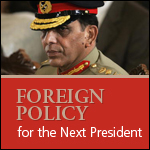The next U.S. president must pursue a balanced strategy toward Pakistan that simultaneously strengthens the civilian government—the best hope for Pakistan’s long-term stability—without alienating the Pakistani army, warns a new policy brief by South Asia expert Ashley J. Tellis.
While strong U.S. support for Pakistan’s civilian government risks undermining military cooperation in U.S. counterterrorism efforts, recognizing the military as the preeminent center of power reinforces a status quo that allowed the Afghan–Pakistan border region to become a sanctuary for terrorist organizations. Managing this dilemma will be difficult but necessary for the success of U.S. engagement with Pakistan.
Recommendations for the next U.S. president:
On Governance:
- Work consistently with the civilian government as the primary authority;
- Resist interceding in party politics and instead support the strengthening of other political institutions such as the bureaucracy, judiciary, civil society, and assemblies; and
- Increase U.S. assistance for Pakistan’s public education, the best weapon against religious radicalism.
On Military Cooperation:
- Privately but clearly assert the need for the Pakistani army and the intelligence services to cut all ties with terrorist groups and offer increased defense cooperation in return;
- Assist the Pakistani government in establishing a National Security Council to reconcile competing security interests;
- Prioritize security assistance that emphasizes intelligence gathering and tactical mobility; and
- Invest in initiatives to strengthen the local police—a critical and often overlooked component.
On Regional Relations:
- Emphasize U.S. determination to maintain a long-term presence in Afghanistan; and
- Encourage reconciliation and increased economic cooperation between India and Pakistan, a rivalry that threatens regional stability and economic development and overly empowers the Pakistani military.
Tellis concludes:
“Even if Islamabad were to overcome the immediate problems related to terrorism, the permanent transformation of Pakistan would be decades away. Consequently, the United States should be patient and satisfied in the interim merely if the trend lines in Pakistan pertaining to good governance, stable macroeconomic management, focused investments in human capital, responsible foreign and strategic policy, and temperate ideological orientations are all at least relatively positive.”
About the Author
Ashley J. Tellis is Senior Associate at the Carnegie Endowment for International Peace, specializing in international security, defense, and Asian strategic issues. He was recently on assignment to the U.S. Department of State as Senior Adviser to the Undersecretary of State for Political Affairs, during which time he was intimately involved in negotiating the civil nuclear agreement with India. Previously he was commissioned into the Foreign Service and served as Senior Adviser to the Ambassador at the U.S. Embassy in New Delhi.





